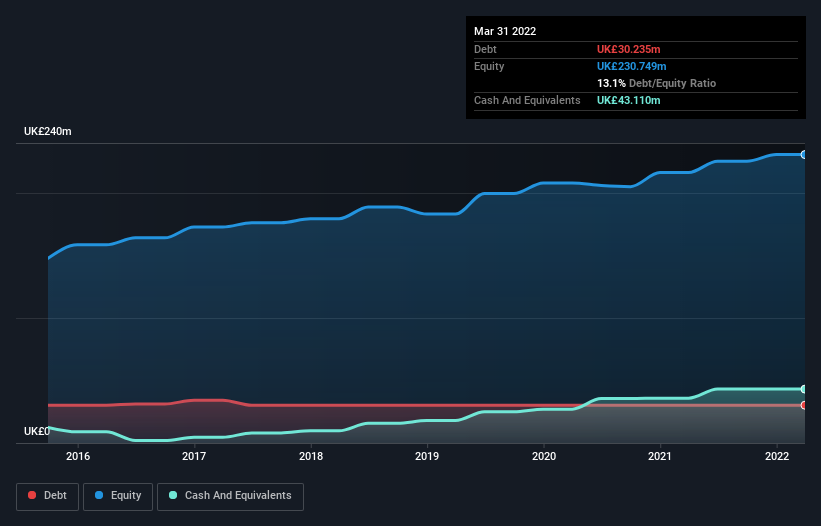Does Jersey Electricity (LON:JEL) Have A Healthy Balance Sheet?
- Oops!Something went wrong.Please try again later.
The external fund manager backed by Berkshire Hathaway's Charlie Munger, Li Lu, makes no bones about it when he says 'The biggest investment risk is not the volatility of prices, but whether you will suffer a permanent loss of capital.' It's only natural to consider a company's balance sheet when you examine how risky it is, since debt is often involved when a business collapses. As with many other companies Jersey Electricity plc (LON:JEL) makes use of debt. But should shareholders be worried about its use of debt?
What Risk Does Debt Bring?
Debt and other liabilities become risky for a business when it cannot easily fulfill those obligations, either with free cash flow or by raising capital at an attractive price. Part and parcel of capitalism is the process of 'creative destruction' where failed businesses are mercilessly liquidated by their bankers. However, a more frequent (but still costly) occurrence is where a company must issue shares at bargain-basement prices, permanently diluting shareholders, just to shore up its balance sheet. Of course, plenty of companies use debt to fund growth, without any negative consequences. When we think about a company's use of debt, we first look at cash and debt together.
Check out our latest analysis for Jersey Electricity
How Much Debt Does Jersey Electricity Carry?
The chart below, which you can click on for greater detail, shows that Jersey Electricity had UK£30.2m in debt in March 2022; about the same as the year before. However, it does have UK£43.1m in cash offsetting this, leading to net cash of UK£12.9m.
How Strong Is Jersey Electricity's Balance Sheet?
The latest balance sheet data shows that Jersey Electricity had liabilities of UK£22.9m due within a year, and liabilities of UK£90.1m falling due after that. Offsetting these obligations, it had cash of UK£43.1m as well as receivables valued at UK£23.4m due within 12 months. So its liabilities total UK£46.6m more than the combination of its cash and short-term receivables.
This deficit isn't so bad because Jersey Electricity is worth UK£162.4m, and thus could probably raise enough capital to shore up its balance sheet, if the need arose. But we definitely want to keep our eyes open to indications that its debt is bringing too much risk. While it does have liabilities worth noting, Jersey Electricity also has more cash than debt, so we're pretty confident it can manage its debt safely.
In fact Jersey Electricity's saving grace is its low debt levels, because its EBIT has tanked 32% in the last twelve months. Falling earnings (if the trend continues) could eventually make even modest debt quite risky. There's no doubt that we learn most about debt from the balance sheet. But ultimately the future profitability of the business will decide if Jersey Electricity can strengthen its balance sheet over time. So if you're focused on the future you can check out this free report showing analyst profit forecasts.
Finally, while the tax-man may adore accounting profits, lenders only accept cold hard cash. While Jersey Electricity has net cash on its balance sheet, it's still worth taking a look at its ability to convert earnings before interest and tax (EBIT) to free cash flow, to help us understand how quickly it is building (or eroding) that cash balance. Over the last three years, Jersey Electricity recorded free cash flow worth a fulsome 95% of its EBIT, which is stronger than we'd usually expect. That positions it well to pay down debt if desirable to do so.
Summing up
While Jersey Electricity does have more liabilities than liquid assets, it also has net cash of UK£12.9m. And it impressed us with free cash flow of UK£13m, being 95% of its EBIT. So we are not troubled with Jersey Electricity's debt use. There's no doubt that we learn most about debt from the balance sheet. But ultimately, every company can contain risks that exist outside of the balance sheet. To that end, you should be aware of the 2 warning signs we've spotted with Jersey Electricity .
If, after all that, you're more interested in a fast growing company with a rock-solid balance sheet, then check out our list of net cash growth stocks without delay.
Have feedback on this article? Concerned about the content? Get in touch with us directly. Alternatively, email editorial-team (at) simplywallst.com.
This article by Simply Wall St is general in nature. We provide commentary based on historical data and analyst forecasts only using an unbiased methodology and our articles are not intended to be financial advice. It does not constitute a recommendation to buy or sell any stock, and does not take account of your objectives, or your financial situation. We aim to bring you long-term focused analysis driven by fundamental data. Note that our analysis may not factor in the latest price-sensitive company announcements or qualitative material. Simply Wall St has no position in any stocks mentioned.


